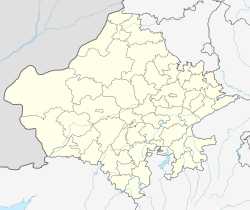Kumher
|
Kumher Kumbher |
|
|---|---|
| city | |
| Location in Rajasthan, India | |
| Coordinates: 27°19′N 77°22′E / 27.32°N 77.37°ECoordinates: 27°19′N 77°22′E / 27.32°N 77.37°E | |
| Country |
|
| State | Rajasthan |
| District | Bharatpur |
| Area | |
| • Total | 5,566 km2 (2,149 sq mi) |
| Elevation | 176 m (577 ft) |
| Population (2001) | |
| • Total | 30,500 |
| • Density | 400/km2 (1,000/sq mi) |
| Languages | |
| • Official | Hindi |
| Time zone | IST (UTC+5:30) |
| PIN | 321201 |
| Telephone code | 11000 |
| Vehicle registration | 05 |
| Sex ratio | 1000:989 ♂/♀ |
Kumher (formerly Kumbher) is a historical city and land of Sinsinwars the initial name of this city was Kuber. It is located in Bharatpur district of Rajasthan, India.
Kumher is located at 27°19′N 77°22′E / 27.32°N 77.37°E. It has an average elevation of 176 metres (577 feet). Kumher is also the birthplace of the illustrious Arya Samaji Vedic and Ayurvedic scholar, Pt. Satyendranath Vaidya (1902–1982).
Kumher was founded by a Jat chieftain Kumbh. In 1754, when Raja Surajmal of Bharatpur was the king, the fort at Kumher was sieged by the Marathas as Peshwa Balaji Baji Rao's younger brother Raghoba (supported by chieftains Scindias and Holkars) wanted Surajmal to be subservant to them. However, the siege did not succeed. In 1754, on behest of Mughal Emperor Alamgir II, Khanderao laid the seize of Kumher fort of Jat Maharaja Suraj Mal of Bharatpur State who had sided with Alamgir's adversary Siraj ud-Daulah. Khanderao Holkar, son of Malhar Rao Holkar, was inspecting his troops on an open palanquin in the battle of Kumher when was hit and killed by a cannonball from the Jat army. Marathas (particularly Scindias and Holkars) signed a treaty with Surajmal and withdrew their army. To honor Khanderao, Suraj Mal built a Chhatri on the cremation spot of Khanderao at Kumher.
...
Wikipedia


